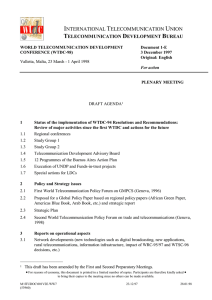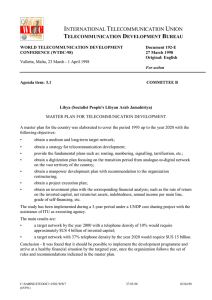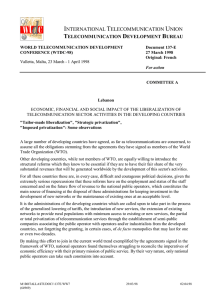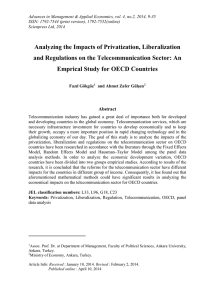I T U D
advertisement
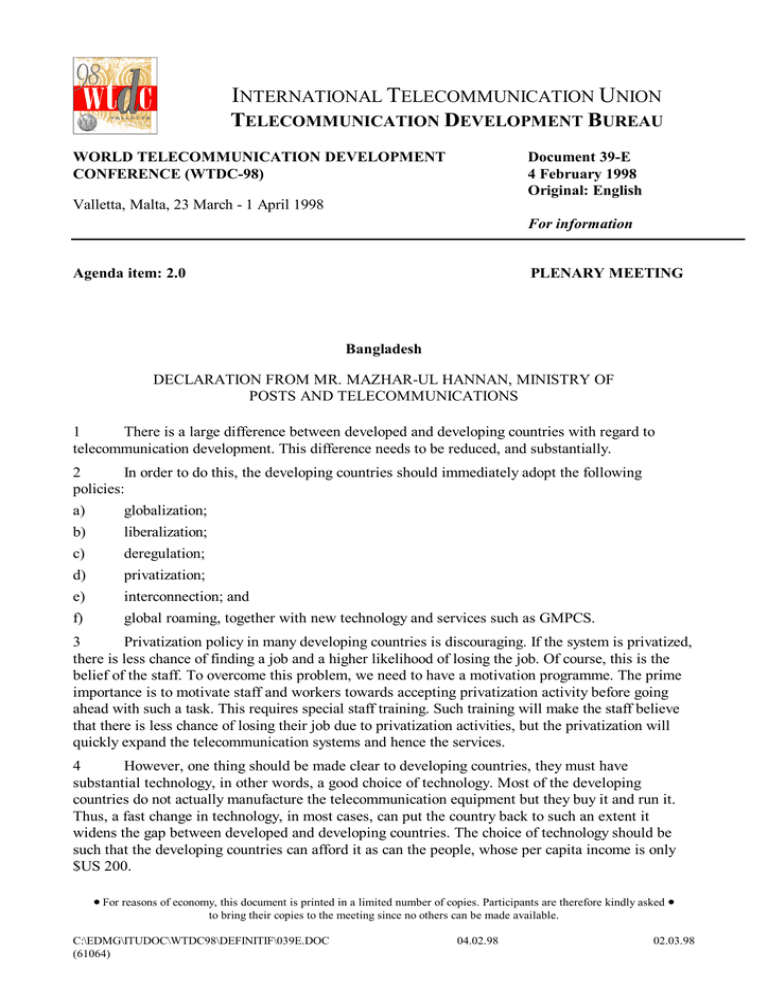
I NTERNATIONAL TELECOMMUNICATION UNION TELECOMMUNICATION DEVELOPMENT BUREAU Document 39-E 4 February 1998 Original: English WORLD TELECOMMUNICATION DEVELOPMENT CONFERENCE (WTDC-98) Valletta, Malta, 23 March - 1 April 1998 For information Agenda item: 2.0 PLENARY MEETING Bangladesh DECLARATION FROM MR. MAZHAR-UL HANNAN, MINISTRY OF POSTS AND TELECOMMUNICATIONS 1 There is a large difference between developed and developing countries with regard to telecommunication development. This difference needs to be reduced, and substantially. 2 In order to do this, the developing countries should immediately adopt the following policies: a) globalization; b) liberalization; c) deregulation; d) privatization; e) interconnection; and f) global roaming, together with new technology and services such as GMPCS. 3 Privatization policy in many developing countries is discouraging. If the system is privatized, there is less chance of finding a job and a higher likelihood of losing the job. Of course, this is the belief of the staff. To overcome this problem, we need to have a motivation programme. The prime importance is to motivate staff and workers towards accepting privatization activity before going ahead with such a task. This requires special staff training. Such training will make the staff believe that there is less chance of losing their job due to privatization activities, but the privatization will quickly expand the telecommunication systems and hence the services. 4 However, one thing should be made clear to developing countries, they must have substantial technology, in other words, a good choice of technology. Most of the developing countries do not actually manufacture the telecommunication equipment but they buy it and run it. Thus, a fast change in technology, in most cases, can put the country back to such an extent it widens the gap between developed and developing countries. The choice of technology should be such that the developing countries can afford it as can the people, whose per capita income is only $US 200. •For reasons of economy, this document is printed in a limited number of copies. Participants are therefore kindly asked • to bring their copies to the meeting since no others can be made available. C:\EDMG\ITUDOC\WTDC98\DEFINITIF\039E.DOC (61064) 04.02.98 02.03.98 -2CMDT98/39-E 5 Investment and money are the main problems in the development of telecommunications for developing countries, especially for the LDCs. Each investment should be targeted towards the actual need for services; the telecommunication services as well as the areas required also need to be determined. 6 To bring the developing countries, especially the LDCs, nearer to the developed world, the developing countries have to break through the net of rigidity and aim towards immediate liberalization and deregulation. This will make it easier to enter into any programme(s) of joint venture: BOT, BLT, BTO, BOOT or a programme which is found suitable for that country. These programmes should be chosen carefully because law of the land and the socio-economic culture of the country will determine which programme(s) will play an easy role in developing telecommunication services for that country. 7 Before achieving all these we must have a workable regulatory framework and a well-stated national policy. _____________ C:\EDMG\ITUDOC\WTDC98\DEFINITIF\039E.DOC (61064) 04.02.98 02.03.98
